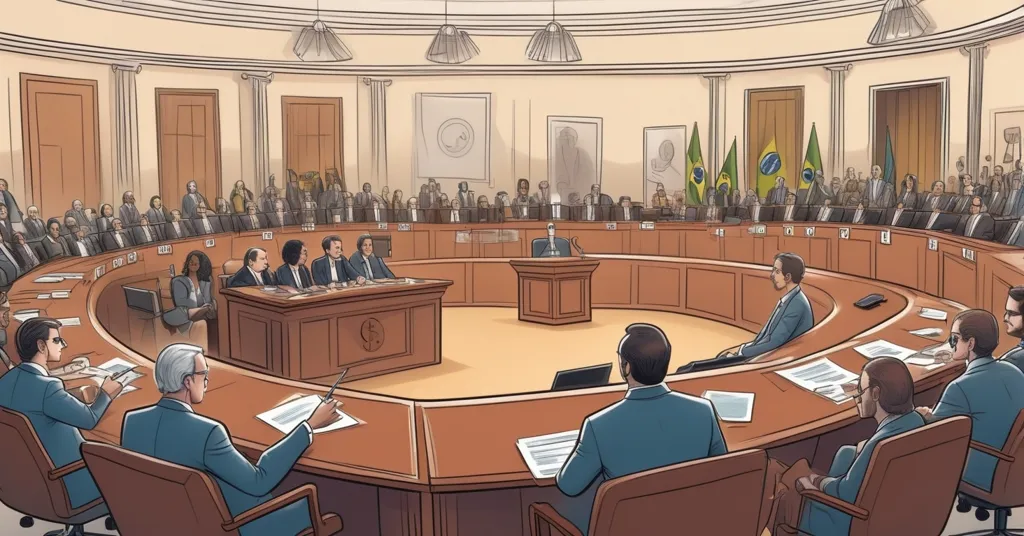Brazilian Senate to Discuss Crypto Regulation in Public Hearing

Brazilian Senate to Hold Public Hearing on Crypto Regulation
The Brazilian Senate is set to hold a pivotal public hearing on cryptocurrency regulation, following a legislative proposal by Senator Soraya Thronicke. This hearing aims to address the country’s rapidly growing virtual assets market and ensure legal security, transparency, and protection for customers and investors.
- Brazilian Senate to discuss crypto regulation
- New bill proposed by Senator Soraya Thronicke
- Hearing to focus on market growth and investor protection
The Economic Affairs Committee of the Brazilian Senate, spurred by a call from Senator Rogerio Carvalho on March 19, is organizing this public hearing. As the leader of the PT party in the Senate, Carvalho highlighted the necessity of the hearing, stating,
“The rapid and accelerated growth rate of the virtual assets market in the country meant a public hearing was essential.”
He further emphasized that the hearing would,
“help guarantee legal security and transparency, as well as customer and investor protection.”
This focus on consumer protection and market stability is crucial as Brazil navigates the complexities of integrating virtual assets into its financial system.
At the center of this hearing is a private member’s bill proposed by Senator Thronicke, a member of the Podemos Party, aimed at regulating Virtual Assets Service Providers (VASPs). For those unfamiliar, VASPs are entities that provide services related to cryptocurrencies, such as issuing coins, holding tokens, and processing settlements. Thronicke’s bill seeks to bring more transparency and security to the crypto sector, as she noted,
“Her bill would bring more transparency and security to the crypto sector.”
This isn’t Thronicke’s first attempt at regulation; she has previously introduced similar proposals in 2020, 2022, and earlier this year, showcasing her dedication to shaping Brazil’s crypto landscape.
The hearing will involve a diverse group of stakeholders, including representatives from the Central Bank of Brazil (BCB), the Securities and Exchange Commission (CVM), the Brazilian Association of Cryptoeconomics (ABCripto), and the Brazilian Financial and Capital Markets Association (Anbima). Their participation ensures a comprehensive view of the regulatory landscape, balancing the perspectives of financial authorities and industry players.
Crypto adoption in Brazil is on the rise, with a recent Bitso study showing a 6% increase in crypto exchange customer numbers. This growth underscores the urgency of establishing a regulatory framework that can keep pace with the market’s expansion while ensuring consumer protection and promoting transparency. However, Brazil’s journey towards effective crypto regulation is fraught with challenges. Balancing the need for innovation with the necessity of regulation will be a delicate task, as the country must navigate the complexities of integrating virtual assets into its existing financial system.
One of the key measures proposed in Thronicke’s bill is requiring exchanges to keep their assets separate from customer funds. While this move aims to enhance security, it might face resistance from the industry. Brazil’s regulatory efforts could have broader implications for global crypto markets, given the country’s significant role in Latin America’s crypto adoption. This public hearing could set a precedent for other nations grappling with similar issues, highlighting the importance of a well-considered approach to cryptocurrency regulation.
While we remain optimistic about the potential of cryptocurrencies to revolutionize finance, it’s crucial to approach regulation with a clear-eyed view of both its benefits and challenges. Brazil’s efforts to refine its crypto laws could pave the way for a more secure and transparent market, benefiting both local and global investors. However, it’s important not to overhype the potential impact—regulation is a double-edged sword that could either stifle innovation or bring much-needed stability to the market.
Critics of the bill might argue that it could hinder the growth of the crypto sector by imposing burdensome regulations on VASPs. They might point out that the crypto space thrives on its decentralized and unregulated nature, and too much oversight could drive innovation elsewhere. Yet, as champions of decentralization and privacy, we must also acknowledge that some level of regulation is necessary to protect users and prevent fraud. The challenge lies in finding the right balance.
Key Takeaways and Questions
- What is the purpose of the public hearing in the Brazilian Senate?
The public hearing aims to discuss and analyze a new legislative proposal for crypto regulation, ensuring legal security, transparency, and protection for customers and investors.
- Who proposed the new crypto regulation bill in Brazil?
Senator Soraya Thronicke proposed the bill to update Brazil’s legislation on virtual assets.
- What role will the Central Bank of Brazil and the Securities and Exchange Commission play in the hearing?
Both institutions will provide regulatory perspectives and insights on the implications of the proposed crypto regulation.
- How has crypto adoption been trending in Brazil according to recent studies?
A Bitso study reported a 6% rise in crypto exchange customer numbers in Brazil, indicating growing adoption.
- What are the potential benefits of the proposed crypto regulation in Brazil?
The proposed regulation aims to increase transparency and security in the crypto sector, ensuring legal security for customers and investors.
- Who else, besides regulatory bodies, will be involved in the public hearing?
Representatives from the Brazilian Association of Cryptoeconomics and the Brazilian Financial and Capital Markets Association will also participate.
- What challenges might Brazil face in implementing crypto regulation?
Challenges include balancing innovation with regulation, ensuring the crypto market’s stability, and addressing the complexities of integrating virtual assets into the existing financial framework.



